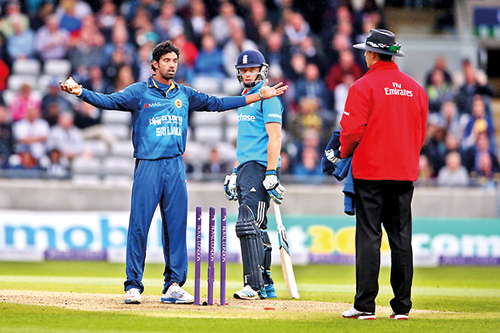Two ‘firsts’ by Martin-Jenkins and Sangakkara
 It seems Sri Lanka cricket is tumbling down without any let-up. Losing games from the junior levels upwards appears the norm. However, the only light recently is the victory in Men’s South Asian Games Cricket competition when the Sri Lanka Under 23 team beat Nepal – though a non-Test playing nation – played in Kathmandu. Now let us see what happens when the Sri Lankan Test team travels to Pakistan to play the all-important two Test matches. Realising the importance of these games, former skipper, Dinesh Chandimal has been, very interestingly – and thankfully, recalled to the team. More importantly, why was he sidelined in the first instance? A question that needs an answer Mr. Selector!
It seems Sri Lanka cricket is tumbling down without any let-up. Losing games from the junior levels upwards appears the norm. However, the only light recently is the victory in Men’s South Asian Games Cricket competition when the Sri Lanka Under 23 team beat Nepal – though a non-Test playing nation – played in Kathmandu. Now let us see what happens when the Sri Lankan Test team travels to Pakistan to play the all-important two Test matches. Realising the importance of these games, former skipper, Dinesh Chandimal has been, very interestingly – and thankfully, recalled to the team. More importantly, why was he sidelined in the first instance? A question that needs an answer Mr. Selector!
At the time of writing, former Pakistan head coach, Mickey Arthur, is set to take over on a 2-year contract as Sri Lanka head coach. Will Sri Lanka’s cricketing future help revamp the situation in the near future? Joining his backroom staff will be Grant Flower as batting coach, David Saker as bowling coach (both spin and pace?), and Shane McDermott as fielding coach, in what seems a complete overhaul of the team’s coaching set-up. Arthur is the 11th head coach of the Sri Lanka men’s team during the last eight years, and he will be returning to Pakistan – with the Lankan team where he had been head coach since 2016. However former head coach Chandika Hathurusinghe still appears to be in the saddle albeit in which capacity is another matter!
It is understood interim head coach Rumesh Ratnayake will also be on tour to help with the transition. Batting coach Grant Flower will not be travelling to Pakistan with the Sri Lanka team.
Four local U-19 players, at the time of writing, have been denied visas ahead for their tour to participate in a Tri-Nation series against the West Indies (hosts) and England.
The Sri Lanka women’s cricket team lost their opening match of the South Asian Games by 7 wickets to Bangladesh women in Nepal. Chamari Atapattu appears to be dominating womens’ cricket.
Then a shocking media report is now doing the rounds about a sex scandal involving a couple of girls within the Sri Lanka women’s cricket team. Still the SL women beat their Maldivian counterparts in a T20 game by a massive 249 runs! What next is the question? The Anti-Corruption Unit of the ICC has been breathing down the necks of Sri Lanka Cricket and an important head has already rolled both internationally, and locally.
Just a tad over a decade ago, however, Sri Lanka won the MCC Spirit of Cricket Award in two successive years – 2007 and 2008. How times have changed.
This year, New Zealand, under the mature leadership of Kane Williamson, has most deservedly carried this coveted prize. How proud the people of that country must be – a country where there are more sheep than people!
More on that subject: The Spirit of Cricket Award is presented to the team which, in the opinion of the elite panel of umpires and referees and the captains of the participating Test teams, who has best conducted themselves on the field within the spirit of the game.
This Spirit is described in the preamble to the Laws of Cricket as follows: “Cricket is a game that owes much of its unique appeal to the fact that it should be played not only within its Laws but also within the Spirit of the Game. Any action which is seen to abuse this spirit causes injury to the game itself.”
In 2007, on receiving this award for the first time, Sri Lanka skipper Mahela Jayawardene said: “I think it’s important to remember the spirit of cricket. We try to enjoy what we do, playing against other countries. That was shown in the World Cup with Ireland – they really enjoyed themselves there and it was great to play against that team too. We are there to win a match but we are also entertainers as well. The most important thing we can do is to enjoy the game. We are very lucky to do what we do and it is vital that we remember that. We play a different brand of cricket and we all enjoy playing. There is so much pride to wear the cap for our country. Spirit of cricket can be explained in many different ways.”
However, in 2014, Jayawardene was again involved in the matter of the spirit of the game where a non-striker takes an unfair start before the bowler releases the ball. Rudely termed as ‘Mankading’, named (in a derogatory sense) after the great Indian all-rounder Vinoo Mankad, who first ran out a batsman in a Test match. A bowler running out a batsman from the non-striker’s end in the act of delivering the ball is deemed “unsportsmanlike”, “ungentlemanly”, “not done” and so on. But is this correct?
In 2014, during an ODI played at Birmingham, Sri Lanka’s off-spinner Sachitra Senanayake, observed England’s wicket-keeper-batsman Joss Buttler taking a false/foul start from the non-striker’s end. Even after warning Buttler, the batsman repeated his action and bowler Senanayake then ran him out. The spectators, comprising mainly of the native population kept on booing the Sri Lankan players right up to the end of day’s play. Adding insult to injury, England skipper Alistair Cook had some nasty things to say to our players at the end of the day; so much for the cricketing skipper of the country that gave the world this once-noble game.
Here’s what skipper Mahela Jayawardena had to say on the same issue: “We gave him (Buttler) a fair chance twice. Before the first warning, we told the umpires that he was taking too much of a lead and then he was warned again. We analysed our game after Lord’s. They took 22 twos in the last 12 overs. Ravi Bopara and he (Buttler) ran riot. And most of the time they were taking foul starts. We just wanted to make sure we got a fair chance. We warned them and we informed the umpires, but they didn’t listen to us, so we had to take the right steps. We always try to play in the right spirit, but if the other team is not playing in the right spirit and not playing within the law, then unfortunately we had to strictly abide by the laws….”
Don Bradman’s comment on this issue of taking a foul start is as follows:
 “An early sensation came in Australia’s innings when Brown was once more run out by Mankad, who, in the act of delivering the ball, held on to it and whipped the bails off with Brown well out of his crease…….and immediately in some quarters Mankad’s sportsmanship was questioned. For the life of me I cannot understand why. The Laws of Cricket make it quite clear that the non-striker must keep within his ground until the ball has been delivered. If not, why is the provision in the Laws of Cricket there which enables the bowler to run him out? By backing up too far or too early the non-striker is very obviously gaining an unfair advantage wittingly or unwittingly. On numerous occasions he may avoid being run out at the opposite end by gaining this foul start……he (Mankad) was scrupulously fair that he first of all warned Brown before taking any action. There was absolutely no feeling in the matter as far as we were concerned, for we considered it quite a legitimate part of the game. I always make it a practice when occupying the position of a non-striker to keep my bat behind the crease until I see the ball in the air. In that way one cannot possibly be run out, and I commend this practice to other players.”
“An early sensation came in Australia’s innings when Brown was once more run out by Mankad, who, in the act of delivering the ball, held on to it and whipped the bails off with Brown well out of his crease…….and immediately in some quarters Mankad’s sportsmanship was questioned. For the life of me I cannot understand why. The Laws of Cricket make it quite clear that the non-striker must keep within his ground until the ball has been delivered. If not, why is the provision in the Laws of Cricket there which enables the bowler to run him out? By backing up too far or too early the non-striker is very obviously gaining an unfair advantage wittingly or unwittingly. On numerous occasions he may avoid being run out at the opposite end by gaining this foul start……he (Mankad) was scrupulously fair that he first of all warned Brown before taking any action. There was absolutely no feeling in the matter as far as we were concerned, for we considered it quite a legitimate part of the game. I always make it a practice when occupying the position of a non-striker to keep my bat behind the crease until I see the ball in the air. In that way one cannot possibly be run out, and I commend this practice to other players.”
Not only Bradman but also the highly respected editor of the monthly London Cricketer magazine and a former President of the MCC (2010 – 2011), Christopher Martin-Jenkins (1945-2012) held a similar view.
In this regard, the writer had a discussion, many years ago, with Christopher Martin–Jenkins aka CM-J. A gentleman to his proverbial toe-nails, it was a great pleasure for the writer to discuss this thorny issue during a visit, when he came to Sri Lanka. During that period the writer was the Sri Lankan correspondent for the Cricketer magazine. Am glad he concurred with the views of cricketing greats such as Bradman and coming down to lesser known lights. In 2007 he was invited to deliver the annual MCC Spirit of Cricket, Cowdrey Lecture, thus becoming the first career journalist to receive this prestigious invitation. Four years later, as MCC president, he created another first when he invited Sri Lanka’s Kumar Sangakkara to deliver the same lecture, the first actively playing cricketer to have delivered the annual Cowdrey lecture. Sangakkara won many accolades for his contribution.
When one recalls the honours that came Sri Lanka’s way, and compare it to what is happening today, the cricketing heart bleeds, to say the least.


